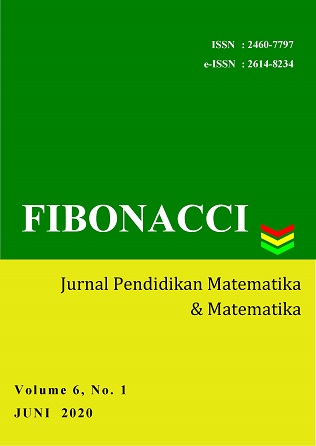ANALISIS KEMAMPUAN BERPIKIR REFLEKTIF MAHASISWA CALON GURU MATEMATIKA PADA MATA KULIAH PROGRAM LINIER
Main Article Content
Abstract
Article Details
Authors who publish with this journal agree to the following terms:
- Authors retain copyright and grant the journal right of first publication with the work simultaneously licensed under a Creative Commons Attribution License that allows others to share the work with an acknowledgement of the work's authorship and initial publication in this journal.
- Authors are able to enter into separate, additional contractual arrangements for the non-exclusive distribution of the journal's published version of the work (e.g., post it to an institutional repository or publish it in a book), with an acknowledgement of its initial publication in this journal.
- Authors are permitted and encouraged to post their work online (e.g., in institutional repositories or on their website) prior to and during the submission process, as it can lead to productive exchanges, as well as earlier and greater citation of published work (See The Effect of Open Access).
References
Agustan, S., Juniati, D., & Siswono, T. Y. E. 2017. Reflective thinking in solving an algebra problem: A case study of field independent-prospective teacher. Journal of Physics: Conference Series, 893(1). https://doi.org/10.1088/1742-6596/893/1/012002
Demirel, M., Derman, I., & Karagedik, E. 2015. A study on the relationship between reflective thinking skills towards problem solving and attitudes towards mathematics. Procedia - Social and Behavioral Sciences, 197 (February), 2086–2096. https://doi.org/10.1016/j.sbspro.2015.07.326
Deringöl, Y. 2019. the Relationship Between Reflective Thinking Skills and Academic Achievement in Mathematics in Fourth-Grade Primary School Students. International Online Journal of Education and Teaching (IOJET), 2019(3), 619–628.
Dewey, J. 1998. How we think: A restatement of the Relation of Reflective Thinking to the Educative Process. Boston: Houghton Mifflin. Boston: Houghton Mifflin.
Gurol A. 2011. Determining the Reflective Thinking Skills of Pre-Service Teachers in Learning and Teaching Process Energy Education Science and Technology Part B: Social and Educational Studies. (3), 387–402.
Manurung, S. Y. 2020. Menjadi Guru yang Reflektif Melalui Proses Berpikir Reflektif dalam Pembelajaran Matematika. POLYGLOT, 16(1), 58–83.
Nuriadin, I., Kusumah, Y. S., Sabandar, J., & Dahlan, J. A. 2015. Enhancing Of Students’ Mathematical Reflective Thinking Ability Through Knowledge Sharing Learning Strategy In Senior High School. International Journal of Education and Research, 3(9), 255–268.
Salido, A., & Dasari, D. 2019. The analysis of students ’ reflective thinking ability viewed by students ’ mathematical ability at senior high school The analysis of students ’ reflective thinking ability viewed by students ’ mathematical ability at senior high school. Journal of Physics: Conference Series, 1157(022121). https://doi.org/10.1088/1742-6596/1157/2/022121
Schaaf, M. Van Der, Baartman, L., Prins, F., Oosterbaan, A., & Schaap, H. 2013. Scandinavian Journal of Educational Feedback Dialogues That Stimulate Students ’ Reflective Thinking. Scandinavian Journal of Educational Research, 57(3)(November 2011), 227–245. https://doi.org/10.1080/00313831.2011.628693 PLEASE
Suharna, H. 2012. Berpikir Reflektif (Reflective Thinking) Siswa SD Berkemampuan Matematika Tinggi Dalam Masalah Pecahan. Seminar Nasional Matematika Dan Pendidikan Matematika, (November), 978–979. Yogyakarta.
Sumarmo Utari. 2017. Hard Skills dan Soft Skills Matematika Siswa. Bandung: Raflika Adit

